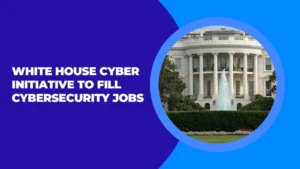Physical Address
304 North Cardinal St.
Dorchester Center, MA 02124
Physical Address
304 North Cardinal St.
Dorchester Center, MA 02124

In a significant move to address the cybersecurity talent shortage, the White House has launched the “Service for America” program. This initiative aims to fill approximately 500,000 open cybersecurity positions across the United States by connecting Americans with jobs in cybersecurity, technology, and artificial intelligence (AI), even for those without traditional qualifications like computer science degrees.
The White House Office of the National Cyber Director, in collaboration with the Office of Management and Budget (OMB) and the Office of Personnel Management (OPM), has developed the “Service for America” program.
National Cyber Director Harry Coker Jr. emphasized the importance of broadening the talent pool, noting that many Americans are unaware of the opportunities available in cybersecurity. The program aims to highlight how people from diverse backgrounds can find rewarding opportunities in this field.
The initiative promotes skills-based hiring, removing unnecessary degree requirements and focusing on the skills candidates can bring to the table.
This approach is designed to make cyber careers more accessible to individuals from various educational and professional backgrounds. The program includes work-based learning opportunities such as registered apprenticeships, allowing individuals to earn while they learn.
To bridge the skills gap, the program features a series of events, including job fairs, internships, and apprenticeship opportunities. These efforts aim to train a new generation of cyber professionals and address the challenges the cybersecurity sector faces, such as burnout and regulatory pressures.
The initiative also supports community-driven efforts to address local workforce needs through collaboration between employers, educational institutions, and government.
The “Service for America” program is part of a larger strategy to strengthen the nation’s resilience against cyberattacks. The White House unveiled a national cyber workforce and education strategy in July 2023, aiming to build up the nation’s resilience to prevent and better withstand malicious cyberattacks.
The initiative also includes a push for additional hiring as part of the national cybersecurity strategy.
The White House has been actively promoting efforts to connect a new generation of prospective candidates with cybersecurity positions.
The administration has announced a $244 million investment in apprenticeships for growing industries, including cybersecurity. The initiative also supports federal efforts to recruit neurodivergent candidates and those who are blind or visually impaired.
The “Service for America” program represents a concerted effort to not only bolster the nation’s cyber defenses but also to create pathways to prosperity for Americans from diverse backgrounds.
By focusing on skills-based hiring and providing various training opportunities, the initiative aims to fill the significant gap in the cybersecurity workforce and enhance national security.